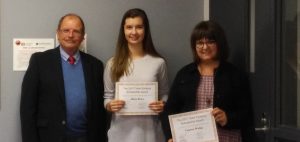By Deron Hamel
Mary-Katherine Rowe says living with epilepsy for the past five years has not been easy, but she has stood up to every challenge she has faced and has now entered her second year of pursuing a teaching degree at Nipissing University.Mary-Katherine was diagnosed with a seizure disorder in 2012, when she was in her first year of high school at Timiskaming District Secondary School, in Haileybury.

When she entered university last year, Mary-Katherine says she had many obstacles to overcome – and the most prominent challenge she had to face was living in North Bay, far away from her family.
“Going through high school knowing that I could have seizures at any point was difficult, but going away to university was more difficult,” she says.
“Being away from my family, taking three types of medications and living in a new environment, where the staff and my fellow students did not know me like they did at home, made me nervous.”
But Mary-Katherine says she turned to another person living with epilepsy for inspiration; someone else who had lived with similar challenges and overcame them.
Chandra Gunn, who was the goalkeeper for the U.S. women’s hockey team at the 2006 Winter Olympics in Turin, Italy, is also living with epilepsy. Mary-Katherine says Chandra’s perseverance has set an example for her to follow.
Like Chandra, Mary-Katherine is also an athlete. In fact, Mary-Katherine made the cut last year and is now a member of Nipissing University’s women’s rowing team, while maintaining a full-time class schedule.
Mary-Katherine notes that epilepsy forced Chandra to temporarily withdraw from her studies when she was a student, but then she went back to university and became a renowned athlete.
“Chandra is an example of a person who is living to the fullest with epilepsy, proving that the condition does not have to prevent people from doing things they love to do,” Mary-Katherine says.
Mary-Katherine is one of the recipients of this year’s Osler Epilepsy Scholarship. The $1,500 scholarship, formerly called the OBCL Epilepsy Scholarship, is being offered to five students this year.
Osler Epilepsy Scholarships are awarded each year to exceptional students who have confronted and overcome remarkable barriers in their academic and personal lives due to their epilepsy.
Applicants also submit an essay about how epilepsy has impacted their lives as well as an outline of their future plans. Applicants also submit a 600- to 900-word essay about a famous person who has epilepsy and what that person’s life means to them.
If you have feedback on this story, or have a story of your own that you would like to share, please contact the newsroom at deron(at)axiomnews.com.






